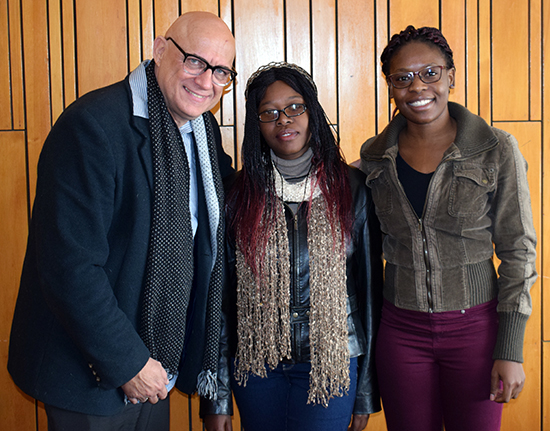News & Events
Black hair matters
“African hair is, and has always been viewed with fascination and sometimes courted controversy among those inside and outside the black communities,” said Dr Khulekani Madlela when she delivered a lecture entitled Black hair matters: representations of black hair in relaxer advertisements and the extent to which it shapes black African women’s hair preferences and attitudes towards hair alteration.

Pictured are Dr Christo Cilliers (Department of Communication Science), Dr Khulekani Madlela (Speaker) and Phumudzo Ratshinanga (Department of Communication Science)
She was invited to speak by the Department of Communication Science in the College of Human Sciences. Dr Madlela said over the years while living in Dubai, her hair and the way she styled it was often viewed with fascination and was always a topic of discussion with colleagues and even strangers. “I’d field questions ranging from ‘are cornrows done by a machine’ to ‘why doesn’t your hair unravel when you braid it?’ and listen to observations like ‘how come your hair grows so fast, yesterday you had short hair but today its shoulder-length’.”
She said the attention her hair generated piqued her interest and as a researcher who is interested in gender representation studies, particularly beauty and body image issues among black African women, she decided to do a study on the politics of the black body, particularly hair.
Her presentation focuses on how black hair, particularly black women’s hair, is represented in advertisements for hair relaxers published in True Love, a South African magazine directed at black women. Using qualitative visual semiotic analysis, her study focused on the process of dehumanisation through visual representation by paying attention to hair, a highly politicised subject in South Africa.
In addition, some correlations and discrepancies between advertising messages and respondents’ beliefs were explored to shed light on the extent to which True Love texts influence the perceptions and hairstyling routine of black female readers living in South Africa.
“I contend that the experiences of black women in South Africa are distinct from those of their counterparts living in other parts of the world. Moreover, the experiences of black women living in South Africa are different from those of their white counterparts owing to the country’s history,” she said, explaining why her presentation focused on how race, gender, culture, and economic and political factors intersect and impact on the representations and perceptions of black hair.
Dr Madlela said that Black hair, which is thicker and curlier than Caucasian and Asian hair, sets Africans apart from other racial groups. But there is more to black hair than meets the eye. When worked on or processed by cultural practices it takes on social meaning and value. “Hairstyles have symbolic meanings and can signify among other things one’s religious beliefs, mental state, health status, age, sexual orientation, and socio-economic status. In the South African context, the topic of black hair is politically charged; hence, it is frequently used as a metaphor for discussing other issues such as race, gender, culture, and identity.”
Owing to its history, black hair continues to be a sensitive political subject that is policed and debated in different platforms by people from various sections of the South African and global communities, said Dr Madlela.
Key concepts surfaced from Dr Madlela’s visual semiotic analysis, namely, Black hair is difficult to manage and needs to be tamed, Black hair is dull and ugly, Black/African pride versus western-centric Ideal, as well as hair length preferences and attitudes towards hair alteration. Findings from the pre-group questionnaire and focus group interviews also showed that the motivations for hair alteration are numerous and not only influenced by what black women see in True Love. The results from her research revealed that the hair altering practice can empower or disempower black women.
“Since black hair serves as a signifier of race, relaxing – which alters the state of black hair – can be seen as an erasure of blackness. From this perspective, hair relaxer advertisements published in True Love can be perceived as disempowering because they force black women to mimic the ‘white’ ideal,” she said.
Dr Madlela continued: “Hair alteration encompasses far more than simply combing and styling, since the black body is defined, controlled and transformed by social, cultural, political and economic dynamics. Although the advertisements promoted the notion that a consumer has freedom of choice, the focus group respondents said they are not entirely free to choose their own hairstyles because there are several factors that inform their choices … Shaped by the challenges they meet while combing or styling their hair and societal pressures, black women adjust and redefine their look through the use of relaxers.”
She concluded by saying that True Love is giving a human face and increasing the visibility of black hair by featuring it on its hair advertisements, however, like all representations, certain aspects are privileged over others. “During the period under purview, True Love promoted the long, straight hair ideal. Furthermore, all eight advertisements for hair relaxers seem to suggest that black hair is only beautiful when it is altered. However, respondents from the study have shown that they have different views regarding hair alteration. It emerged that hair alteration is both empowering and disempowering; depending on who stands to benefit from the visual change.”
* Compiled by Rivonia Naidu-Hoffmeester
Publish date: 2018-09-06 00:00:00.0

